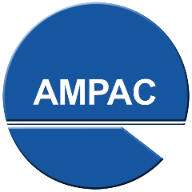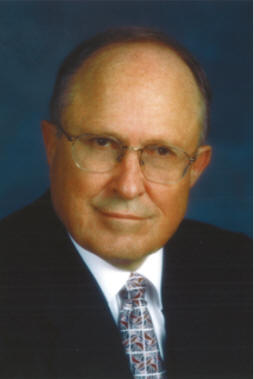CEOCFO-Members Login
Become A Member!

American Pacific Corp.
Print Version

|
This is a printer friendly page!
Originally a specialty chemical company,
diversification into fine chemicals and aerospace equipment has given
American Pacific Corp. the kind of organic growth that they were seeking

Basic Materials
Specialty Chemicals
(APFC-NASDAQ)
www.apfc.com
American Pacific Corp.
3770 Howard Hughes Parkway, Suite 300
Las Vegas, NV 89169
Phone: 702-735-2200

John R. Gibson
Chairman and CEO
Interview conducted by:
Lynn Fosse, Senior Editor
CEOCFOinterviews.com
Published - June 22, 2007
BIO:
John Gibson joined American Pacific in 1992 as Vice President – Operations.
He was promoted to President and CEO in 1997 and elected Chairman in 1998.
Mr. Gibson was named Chairman and CEO in October 2006, upon the hiring of
Dr. Joseph Carleone as President and COO.
Prior to joining American Pacific John Gibson was employed by U.S. Steel for
28 years. He is a graduate in Metallurgical Engineering, University of
Nevada, Reno and also holds a degree, cum laude, in Economics from Colorado
College. He is a member and active in several professional societies
including the Aerospace Industries Association, Board of Governors, the Utah
Association of Energy Users, Past President, the Nevada Taxpayers
Association, the Conference Board and others.
He lives with his wife, Marianne, in Las Vegas.
Company Profile:
American Pacific is a specialty
chemical company that produces (i) energetic products used primarily in
space flight and defense systems, automotive airbag safety systems and
explosives, (ii) Halotron, a clean fire extinguishing agent and (iii) water
treatment equipment. In November 2005, American Pacific acquired the former
Aerojet Fine Chemicals business. Ampac Fine Chemicals, as it is now known,
is a leading manufacturer of active pharmaceutical ingredients and
registered intermediates under cGMP guidelines for commercial customers in
the pharmaceutical industry, involving high potency compounds, energetic
and nucleoside chemistries, and chiral separation, In 2004 American Pacific
acquired the former Atlantic Research Corporation liquid in-space propulsion
business. Ampac-ISP, as it is now known, is a leading supplier of commercial
and military propulsion products and the world’s largest producer of
bipropellant thrusters.
CEOCFO: Mr. Gibson: what is your vision as
CEO and Chairman of American Pacific Corp., and how do you get there?
Mr. Gibson: “We are a 52-year-old
company, founded in 1955 in Las Vegas. We were originally a specialty
chemical company. Although our products were very well received in the
market, we eventually found that there was not the kind of potential for
organic growth that we wanted, so we sought to diversify our company. There
are three legs to our company now and the first diversification was to
purchase a small aerospace equipment company. Our last acquisition, the
third leg of our company was to purchase a fine chemical business where
active pharmaceutical ingredients are made as well as registered
intermediates. We now are a company with three parts to it, the first part
being a specialty chemical division in which we have fairly healthy cash
flow and long-term profit. The second part in aerospace equipment is small;
we intend to grow it. We make small thrusters for space satellites in that
business. The third which we believe where we will find much of our growth
is in fine chemicals as a part of the larger pharmaceutical market.”
CEOCFO:
What are fine chemicals?
Mr. Gibson: “Fine chemicals are
distinguished from specialty chemicals in that they are for a specific high
quality application, for example in drugs that are commonly used by people;
as opposed to much of specialty chemicals which are often commodities.
Generally speaking fine chemicals are organic in nature and require very
careful processing and sophisticated equipment in order to make the final
chemical for the eventual manufacturer of a specific drug that they are
applied to.”
CEOCFO: Was
being in the specialty chemical and then going into the fine chemicals a
natural progression?
Mr. Gibson: “We felt comfortable with
it. They do not necessarily correlate in chemistry because in specialty
chemicals, generally speaking you are processing enormous quantities and it
is fairly straight-forward chemistry, where in fine chemicals it is more
difficult and tedious to accomplish. The similarity however was that in our
specialty chemical business we think sought out, found and cultivated niche
markets. For example, we are generally speaking in our specialty chemical
business, a sole supplier. We sought the same kind of acquisition in fine
chemicals. We believe we found it. Not that there is anything wrong with
aspirin, but we are not making aspirin or the common kind of ingredient that
you would find in many drugs; we are making very sophisticated ones
primarily for antivirals, cancer treatment and the central nervous system.
That is what we sought, the kind of market we are used to and especially
critical in terms of customer relationships, in terms of being able to be a
sole or perhaps dual supplier.
CEOCFO: Are
you in a leading market position in all of your areas?
Mr. Gibson: “We have a leading market
position in our primary specialty chemical; we are the sole provider of
ammonium perchlorate, which is the oxidizing chemical used for example in
the space shuttle and minuteman defense missile. We are the only supplier in
North America for that. We are not the leading supplier in active
pharmaceutical ingredients, but we certainly have a very healthy position in
the market and where we are participating, we are the sole supplier or one
of two suppliers generally speaking. That is how we see ourselves. However,
in terms of that whole market we are not a market leader.”
CEOCFO: Do
you have to go after new business?
Mr. Gibson: “Absolutely, because what
happens in many of these areas whether it is aerospace, specialty or fine
chemicals, the market changes with time; even though you may be very good at
specifically what you are doing, you have to stay ahead of the game. We talk
to customers all the time, we want to know what they are doing that is new
and different and if we can help. We maintain a strong relationship on the
technical side with Georgia Tech University in Atlanta, and we are
participating in certain research projects there that hopefully, will lead
to commercial markets.”
CEOCFO: In
the area of fine chemicals where you see much promise, how do you get the
business there when you are newer to the industry, how does that business
work?
Mr. Gibson: “The fine chemical business
that we purchased, developed at Aerojet General Corporation, GenCorp, as it
is known today near Sacramento, California. It was a natural outgrowth of
certain chemicals that the company handled or processed in the space
propulsion industry and so they saw the connection and similarity and they
actually started the business many years ago. By the time that we purchased
or acquired that business it was very well established and was an ongoing
business for us. What you have to do probably more than any other single
factor is develop a trust and reliability with customers in which they know
that they can offer to permit you to use their intellectual property to
manufacture a part of a chemical that they need for a specific drug. As I
say, you do not necessarily engage yourself in your own research in those
kinds of things, what you do is perfect your process and chemical handling
to the extent that when the moment arises and there is a new or different
drug that requires a specific kind of talent to be able to make, then we are
there. We spend a lot of time in the marketplace with customers or potential
customers in the fine chemical business.”
CEOCFO:
What is the financial picture like today for AMPAC?
Mr. Gibson: “When we last reported
earnings, which was the second fiscal quarter, our fiscal year begins on
October 1st so our second fiscal quarter ended March 31st
for 2007; we indicated to the market that we continued to believe that we
would have sales of approximately $170 million and we foresaw EBITDA
performance for the same fiscal year of $36 million. We are doing the things
we had visualized and had become our objectives four years ago. We have more
than doubled our revenue, we had a few years in which we did not return a
profit and those years were consumed by finding and getting the right
acquisition at the right time and then making it work. We believe we are now
at the threshold of gaining a return on that on those investments we made.”
CEOCFO: Do
you need to build any new facilities?
Mr. Gibson: “The capital spending prior
to the fine chemical business is rather modest. In the fine chemical
business that is always a significant consideration because the formulations
change, the equipment required changes somewhat. As of right now, I do not
think it is particularly significant. We have indicated to the market our
capital spending this fiscal year will be somewhere in the neighborhood of
$10 million. We may have to increase it somewhat in the future but that is
all in our plans. We expect that the return on any of those investments will
be beneficial to the company.”
CEOCFO:
What do you see two or three years down the line?
Mr. Gibson: “I hesitate to say more than
what we have said publicly but it is obvious that we would not be doing what
we are doing if we didn’t expect positive returns in the future and that is
what everyone of my employees, engineers and scientists, are committed to.
We see a healthy company in the future.”
CEOCFO: Do
you see more acquisitions?
Mr. Gibson: “Actually the other part of
the capital spending question or Capex, is that if we find a facility that
is available and fits our purpose and would in effect be a substitute for
Capex or capital spending, then that is what we will do, so we do see
acquisitions in the future. I do not believe on the order, size or magnitude
of this last one we did with fine chemicals which was in the range of $130
million, but modest increases rather than capital spending, yes we see that
in the future.”
CEOCFO:
What are the challenges of running three separate businesses under one
umbrella?
Mr. Gibson: “It has been fun and a
challenge at the same time. What I have tried to do and every CEO is
probably somewhat different, but I have tried to give, especially the new
acquisitions, as much autonomy as I can. They were healthy businesses to
begin with. I did not want to interfere with their organization or their
business plan. I wanted their business plan to be what they believe they
could accomplish and it has been so far. Obviously, we had our own strategic
objectives over all, but I think when you begin to branch out in a business,
and ours was single-focus for fifty years; you have to develop trust that
your managers know what they are doing and will do the right thing. So far,
I have been very satisfied with the operation. I should add that the
executives are extremely important and I did bring on a President and COO,
Dr. Joseph Carleone. Dr. Carleone had previously spent over 20 years in
aerospace and he was the actual president of the fine chemical business that
we purchased. It was a natural change and promotion for us that we were able
to accomplish and I have been very satisfied with his work. Obviously, he is
also the key link between me, and the operating managers in the facilities.
We work closely together. I think that is a key. The other thing is with an
organization in today’s world, you have to be careful that it remains lean.
In our case there are a couple of things that are interesting, one is that
we have no significant formal sales force; every one of us is a sales
person. We have program managers, we see customers at that level, at the
President’s level and certainly at the division leader’s level all the time.
That is important and I think it keeps the overhead under control. Selling
is a talent that I have the highest respect for, but I think you can make an
effective salesman out of the engineering and technical personnel if you
cultivate it and work at it. We have a modest staff; we will do $170 million
and are right at 500 employees. We do not for example have in-house legal
staff here at headquarters. The only point is there are certain activities
and I think that is one of them that you can effectively outsource and that
has worked well. In selling, we do the selling. In legal work when we need
work, we go outside.”
CEOCFO: Is
the investment community starting to pay attention?
Mr. Gibson: “Lately it has been very
good. The share price on the market on Nasdaq is up over 100% since January
1st; that is unusual for us. Many accused our stock as being what
they termed “tornado proof.” It wouldn’t fall a lot in bad times and in good
times it would not rise much. I think the market is beginning to understand
what we are trying to do so the recent activity in our stock has been very
good for the shareholders.”
CEOCFO: In
closing, why should potential investors look at the company?
Mr. Gibson: “I think we have a bright
future. There is nothing wrong with the east; we have a small facility in
Niagara N.Y., but I think in the west is where the growth is taking place.
By carefully selecting the niche markets in which we choose to participate,
I think there is a bright future here. I would hope that our present and
future shareholders will be very satisfied at what they see.”
disclaimers
Any reproduction or further distribution of this
article without the express written consent of CEOCFOinterviews.com is prohibited.
|


